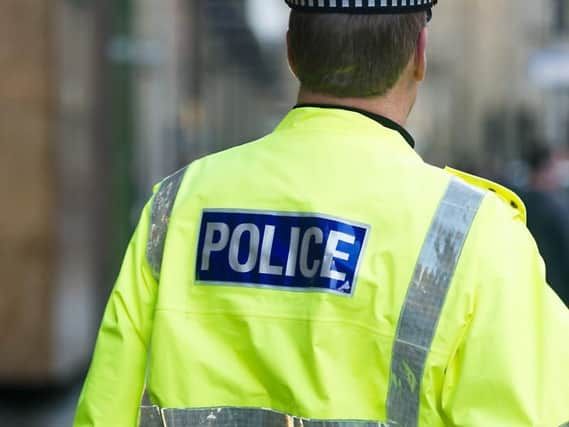Firearms officers to patrol general election venues


Police Scotland said firearms officers were being deployed due to “nervousness” about attempts to disrupt the democratic process.
Officers “overtly carrying” guns will also be at Hampden Park for Scotland’s World Cup qualifier against England on Saturday and at Murrayfield Stadium on Friday night for a Robbie Williams concert.
Advertisement
Hide AdAdvertisement
Hide AdDetails of the security operations came as senior officers warned of an evolving threat from attackers inspired by so-called Islamic State, which is becoming more difficult to predict.
Despite the current UK threat level being at “severe”, meaning an attack is highly likely, Police Scotland said there was no intelligence terrorists would target any of the upcoming events, with armed officers in place to provide public reassurance.
Armed response vehicles (ARVs) will patrol polling stations and count venues as part of a “patrol matrix”, the force said.
Assistant Chief Constable Bernard Higgins said: “There’s nervousness about the potential to disrupt the democratic process but while we are still operating at UK severe, there’s no intelligence that any election event, location or venue is going to be the target of any sort of action or terrorist activity.
“We will be maintaining a visible presence at certain locations and we will be maintaining a static presence at all the counting venues.
“To support this operation and all the events over the next couple of days, we have maintained our armed policing response at a level which is approximately just slightly more than double our normal business as usual and the intention is to maintain that right the way through to around Sunday and then review it.”
At the Robbie Williams concert at Murrayfield on Friday, the 57,000-strong crowd will be searched before entering the stadium and anyone with a large bag will be asked to leave it at a bag drop-off zone.
On Saturday, Hampden in Glasgow will open at 3pm ahead of the 5pm kick-off, half an hour earlier than usual to give time for security searches of the crowd of more than 50,000.
Advertisement
Hide AdAdvertisement
Hide AdArmed officers will be on patrol and will meet supporters as they leave the stadium. Police Scotland has around 600 trained ARV officers, although only around 400 are full-time firearms officers.
The numbers were increased last year following the Paris terror attacks and amid criticism from the Scottish Police Federation, which represents the rank and file, that Scotland was “woefully under-equipped, under-resourced and under prepared” to deal with a similar incident.
Mr Higgins said the current firearms posture was a “direct response” to the terrorist attack in London on Saturday.
While police have no intelligence of a terror threat to Saturday’s match at Hampden, they have intelligence that “risk” supporters, possibly with links to the far right, may be planning to travel to Glasgow to cause disorder and violence.
Mr Higgins is authorising extra powers allowing officers to ask people to remove items of clothing such as hoodies pulled down low, or scarves masking their faces, to make it easier to identify them.
Police will also be carrying out a “spotter” operation, with officers from England and Wales helping to identify individuals known to be a risk.
They are also urging people to act responsibly while travelling to the match. Alcohol bans will be in place on some trains and British Transport Police (BTP) will have extra officers on duty.
The update on the security plans came as senior officers appeared before the Scottish Police Authority (SPA) in Glasgow.
Advertisement
Hide AdAdvertisement
Hide AdDeputy Chief Constable Iain Livingstone said there were no Scots among the eight killed and 51 injured in Saturday’s attack.
And he said his officers were continuing to offer support to the families of Piotr Cheylewski and Laura MacIntyre, 15, both of whom were injured in the Manchester attack and remain in hospital.
Mr Livingstone expressed confidence his force had enough resources to meet the current threat, but said the risk posed by radicalised attackers was becoming harder to predict.
He said: “Against the current threat level and operational challenge, I have a confidence we can deal with what’s in front of us.
“Summer always brings demands. We’re working very closely...to make sure we’re looking ahead and seeing where there might be pinch points in terms of significant events. I have confidence we have enough resources at the moment, but clearly the international picture and the threat picture may change.”
Mr Livingstone said he had spoken with other senior officers across the UK earlier this week, including those from the Metropolitan Police.
“The general reflection was that the terrorist threat is much broader than it was previously,” he said.
“The Manchester attack was more sophisticated than others in that it had a IED (improvised explosive device) involved.
Advertisement
Hide AdAdvertisement
Hide Ad"But the Westminster attack and the London Bridge attack were relatively unsophisticated and that makes the ability to properly identify where the next attack is coming from very, very challenging.
“Not only within policing, but across society there is a need to reflect on how we deal with the current threat and where that comes from.”